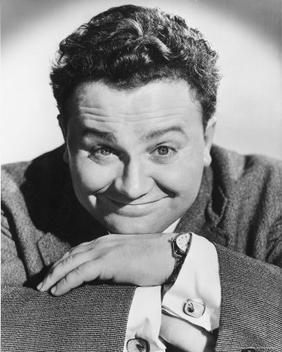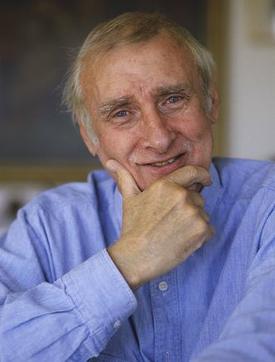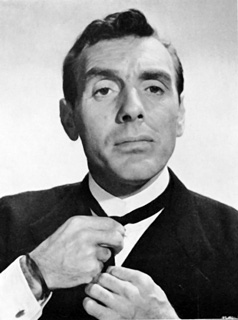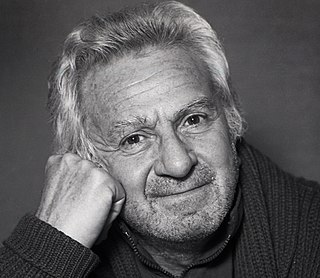
Sir Harold Donald Secombe was a Welsh comedian, actor, singer and television presenter. Secombe was a member of the British radio comedy programme The Goon Show (1951–1960), playing many characters, most notably Neddie Seagoon. An accomplished tenor, he also appeared in musicals and films – notably as Bumble in Oliver! (1968) – and, in his later years, was a presenter of television shows incorporating hymns and other devotional songs.

Terence Alan "Spike" Milligan was an English-Irish actor, comedian, writer, musician, poet, and playwright. The son of an English mother and Irish father, he was born in British Colonial India, where he spent his childhood before relocating in 1931 to England, where he lived and worked for the majority of his life. Disliking his first name, he began to call himself "Spike" after hearing the band Spike Jones and his City Slickers on Radio Luxembourg.

The Goon Show is a British radio comedy programme, originally produced and broadcast by the BBC Home Service from 1951 to 1960, with occasional repeats on the BBC Light Programme. The first series, broadcast from 28 May to 20 September 1951, was titled Crazy People; subsequent series had the title The Goon Show.
I'm Sorry, I'll Read That Again was a BBC radio comedy programme that originated from the 1964 Cambridge University Footlights revue, Cambridge Circus. This is a scripted sketch show. It had a devoted youth following, with the live tapings enjoying very lively audiences, particularly when familiar themes and characters were repeated; a tradition that continued into the spinoff show I'm Sorry I Haven't a Clue.

Eric Sykes was an English radio, stage, television and film writer, comedian, actor, and director whose performing career spanned more than 50 years. He frequently wrote for and performed with many other leading comedy performers and writers of the period, including Tony Hancock, Spike Milligan, Tommy Cooper, Peter Sellers, John Antrobus, and Johnny Speight. Sykes first came to prominence through his many radio credits as a writer and actor in the 1950s, most notably through his collaboration on The Goon Show scripts. He became a TV star in his own right in the early 1960s when he appeared with Hattie Jacques in several popular BBC comedy television series.

Rowan & Martin's Laugh-In is an American sketch comedy television program that ran for 140 episodes from January 22, 1968, to March 12, 1973, on the NBC television network, hosted by comedians Dan Rowan and Dick Martin. It originally aired as a one-time special on September 9, 1967, and was such a success that it was brought back as a series, replacing The Man from U.N.C.L.E. on Mondays at 8 pm (ET). It quickly became the most popular television show in the United States.

Gilbert Jeremy Gottfried was an American stand-up comedian and actor, known for his exaggerated shrill voice, strong New York accent, and his edgy, often controversial, sense of humor. His numerous roles in film and television include voicing Iago in the Aladdin animated films and series, Digit LeBoid in Cyberchase, Kraang Subprime in Teenage Mutant Ninja Turtles, and the Aflac Duck. He was also known for his role as Mr. Peabody in the Problem Child film series.
Not Only... But Also is a BBC British sketch comedy show starring Peter Cook and Dudley Moore that aired in three series between 1964 and 1970.

John Bluthal was a Polish-born Australian actor and comedian, noted for his six-decade career internationally in Australia, the United Kingdom and the United States. He started his career during the Golden Age of British Television, where he was best known for his comedy work in the UK with Spike Milligan, and for his role as Manny Cohen in the television series Never Mind the Quality, Feel the Width. In later years, he was known to television audiences as the bumbling Frank Pickle in The Vicar of Dibley. At 85 he played Professor Herbert Marcuse in the Coen brothers' film Hail, Caesar! (2016).

Q... is a surreal television comedy sketch show written by Spike Milligan and Neil Shand, and starring Spike Milligan with supporting players, usually including Julia Breck, John Bluthal, Bob Todd, and John Wells. The show ran from 1969 to 1982 on BBC2. There were six series in all, the first five numbered from Q5 to Q9, and a final series titled There's a Lot of It About. The first and third series ran for seven episodes, and the others for six episodes, each of which was 30 minutes long.

The Phantom Raspberry Blower of Old London Town was a 1971 episode of LWT's Six Dates with Barker that was written by Spike Milligan and later adapted by Ronnie Barker for The Two Ronnies sketch show. Set in Victorian London, it featured a Jack the Ripper–style madman who stalked the streets and killed or stunned his victims by blowing them a raspberry.

The World of Beachcomber was a surreal television comedy show produced by the BBC inspired by the Beachcomber column in the Daily Express newspaper.
"The Fear of Wages" is an episode of the British radio comedy The Goon Show, written by Spike Milligan and Larry Stephens. As the 25th episode of the sixth series, it was first broadcast on 6 March 1956 and was among the shows first repeated in the 1970s following the success of The Last Goon Show of All in 1972.

The Last Goon Show of All is a special edition of the BBC Radio comedy programme The Goon Show commissioned as part of the celebrations of the 50th anniversary of the BBC. Simulcast on radio and television on 5 October 1972, the performance reunited Spike Milligan, Peter Sellers and Harry Secombe as well as other contributors to the programme's original run. It was later released as a long-playing record and on compact disc. The video recording of the television broadcast was also released on VHS and later on DVD, although with some omissions. In early October 2007, 35 years after the original broadcast, a full unedited version was broadcast on BBC 7, the digital radio channel dedicated to re-runs of classic shows.
John Logan Browell was a radio producer who worked primarily in BBC Radio.

Spike Milligan's fourth volume of war memoirs, Mussolini: His Part in My Downfall, spans the landing in Salerno, Italy on 23 September 1943 to his being invalided. While this is only four months, the text is nearly as long as the three earlier volumes together. Although the humorous writing is similar, there are no ersatz communiques and almost no sketches; the photographs are fewer and smaller.

The Great McGonagall is a 1974 British comedy film directed by Joseph McGrath and starring Spike Milligan in the title role, Peter Sellers as Queen Victoria and Julia Foster as Mrs McGonagall. It is a humorous biopic of the Scottish poet William McGonagall that includes several of McGonagall's actual poems, his appearing in the title role of Macbeth and his "improvement" of the Bard's plot, his pilgrimage to Balmoral Castle, the attempted assassination of Queen Victoria by Roderick McLean and a tribute to McGonagall from Lt Frederick Rollo of the Royal Scots in Zululand.












